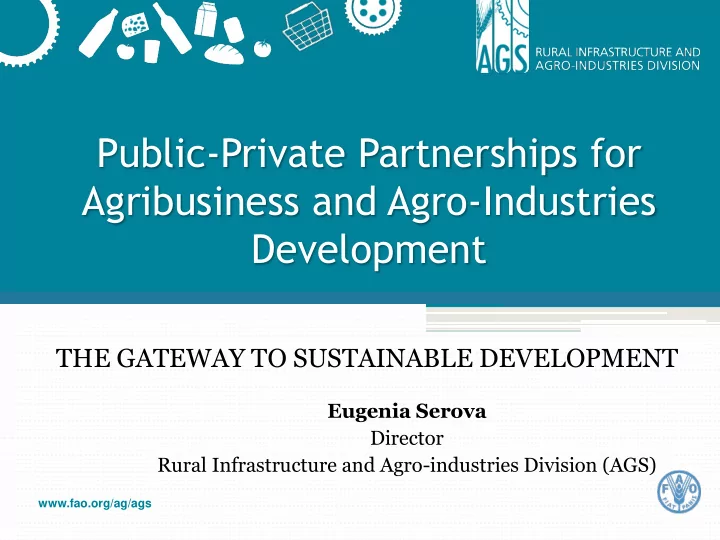

Public-Private Partnerships for Agribusiness and Agro-Industries Development THE GATEWAY TO SUSTAINABLE DEVELOPMENT Eugenia Serova Director Rural Infrastructure and Agro-industries Division (AGS) www.fao.org/ag/ags
“If you want to go fast, go alone. If you want to go far, go together.” African Proverb
Why partner? Rationale for Agri-PPPs in Africa 1. Scale of investment means public sector cannot do it alone 2. High risk of doing business in agriculture can deter private sector participation 3. Partnerships can promote inclusion of smallholder producers
FAO Agribusiness PPP Appraisal 2011-2013 • 70 cases in 15 countries, 3 regions, specific criteria Africa Latin America Asia Ghana (5) Chile (4) Thailand (5) Kenya (4) Colombia (4) Indonesia (5) Nigeria (5) Ecuador (4) China (5) Tanzania (4) Guatemala (4) Pakistan (5) Uganda (4) Peru (5) Philippines (5) http://www.fao.org/ag/ags/ags-division/publications/country-case-studies/en/ 2014- onwards • Synthesis of international experiences forthcoming • Ag PPP Policy support (Vietnam, Philippines) • Develop agri-PPP guidelines for public partners
Agri-PPP themes FAO Study – 70 cases 1. Value chain development 57% 2. Innovation & technology transfer 23% 3. Business development/advisory services (BDS) 11% 4. Market infrastructure & logistics 9%
Typology of PPP cases per region 100% BDS 90% 80% Market 70% infrastructure 60% & logistics 50% Innovation and 40% technology transfer 30% 20% Value chain development 10% 0% Africa Asia LAC
Who are the Partners? Private Public • Global and domestic food • Central and companies decentralized government • Input supply and agro-processing • State banks and rural finance companies corporations • Financial institutions • State-owned enterprises • SMEs and producer associations • Research institutions, universities, marketing boards • Civil society (NGOs) • Donors • 3rd party contractors
Impacts from PPP Improved food security through increased agricultural productivity, improved product quality and safety ▫ Improved access and uptake of new technologies by farmers ▫ Reductions in post-harvest losses Increased rural income and employment opportunities on and off-farm ▫ Improved market access for smallholders ▫ Better supply chain coordination ▫ Development of entrepreneurial, technical and managerial skills for smallholders and SMEs Inform national policy debate on role of private sector in inclusive and sustainable agribusiness development
Issues & Challenges : Not a panacea ! • Legal and institutional obstacles • Limited capacity of public partners Institutional weakness • Coordination issues with multiple partners • Lack of transparency and accountability in partnership contracts • Potential for large enterprises to exert excessive market power Governance • Over reliance on public sector capacity • Poor risk management and inadequate risk sharing • Weak monitoring and evaluation Management
Conclusion from Africa Study “...Public private partnerships have the potential to: • accelerate agribusiness investment • strengthen value chain activities and business linkages • mobilise producer communities for economic activities • promote technology transfer and linkages with research systems Above all, PPPs are tools for focusing on specific, inclusive development objectives and striving for their achievement.” (FAO, 2013).
Thank you for your attention! For detailed PPP country reports, visit: www.fao.org/ag/ags
Recommend
More recommend